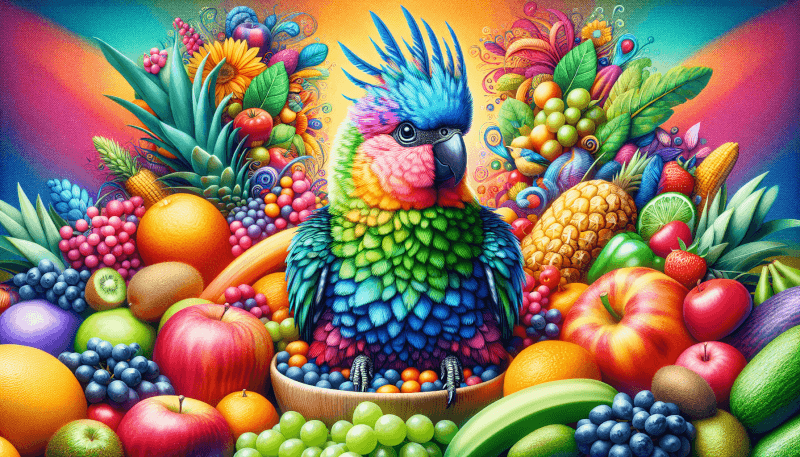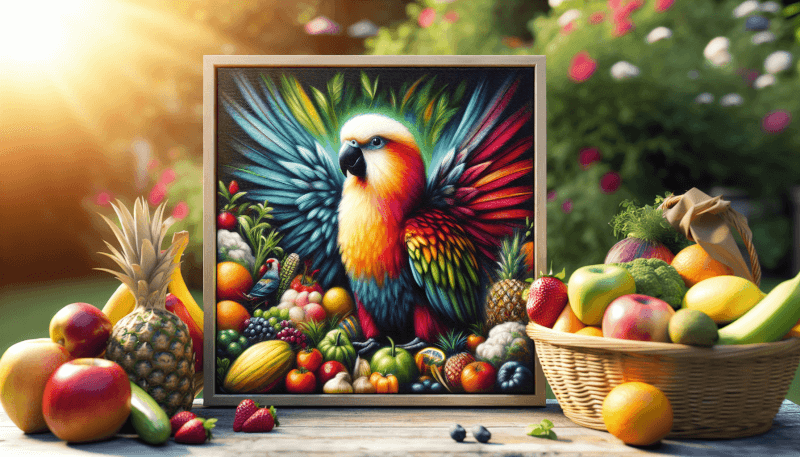Are you a proud bird owner looking for ways to ensure the health and happiness of your feathered friend? Look no further! In this article, we will explore some simple yet effective tips on how to keep your bird healthy and happy. From providing a nutritious diet to creating a stimulating environment, we’ve got you covered. So, let’s dive right in and discover how you can give your beloved bird the care it deserves!

Providing a Nutritious Diet
One of the most important aspects of keeping your bird healthy and happy is providing a nutritious diet. A well-balanced diet is essential for their overall well-being and can help prevent a variety of health issues.
To ensure your bird is getting the nutrients they need, it’s important to offer a variety of fresh fruits and vegetables. These should make up a significant portion of their diet and can include options such as carrots, broccoli, apples, and leafy greens. These foods provide essential vitamins and minerals that are crucial for their health.
In addition to fruits and vegetables, high-quality bird pellets should also be included in their diet. These pellets are specially formulated to meet the nutritional needs of birds and provide a balanced mix of proteins, carbohydrates, and essential vitamins and minerals. Be sure to choose pellets that are appropriate for the type of bird you have.
While seeds can be offered as a treat, it’s important to do so in moderation. Seeds are high in fat and can lead to weight gain and other health issues if given in excess. Instead, focus on providing a varied diet that includes a mix of fruits, vegetables, and pellets.
Lastly, it’s important to avoid offering sugary and fatty foods to your bird. These types of foods can lead to obesity and other health problems. Stick to nutritious options and avoid any processed or sugary treats.
Ensuring Proper Hydration
Proper hydration is crucial for your bird’s health. Birds can easily become dehydrated, so it’s important to ensure they always have access to a fresh and clean water source.
Be sure to change the water daily to prevent bacteria from growing. It’s also important to clean the water container regularly to prevent any buildup of bacteria or algae. Consider using a water dispenser with a drinking tube, as this can help keep the water clean and free from any contamination.
Monitoring your bird’s water intake is essential. Their water dish should always be filled, and you should keep an eye on how much water they are drinking. If you notice a decrease in their water intake, it could be a sign of dehydration, and you should consult with a veterinarian.
Maintaining a Clean Cage
Keeping your bird’s cage clean is vital for their health and well-being. Regular cleaning helps prevent the buildup of bacteria and other harmful substances that can lead to illness.
Start by removing droppings and uneaten food from the cage daily. This will help keep the environment clean and prevent the growth of bacteria. Additionally, wash the cage with bird-safe cleaners regularly. Avoid using any harsh chemicals that could be toxic to your bird. Instead, opt for mild soap and water or specialized bird cage cleaners.
It’s also important to provide your bird with a comfortable and spacious environment. Ensure they have enough room to move around and stretch their wings. Provide perches at different heights so they can exercise their feet and legs. Additionally, consider adding toys and enrichment items to keep them mentally stimulated.
Offering Mental Stimulation
Birds are intelligent creatures that need mental stimulation to stay happy and healthy. Providing a variety of toys is a great way to keep them entertained. Choose toys that are safe for birds and offer different textures and materials. Rotate the toys regularly to prevent boredom and keep your bird engaged.
In addition to regular toys, consider introducing puzzle toys to stimulate their cognitive abilities. These toys often require the bird to figure out a problem or puzzle to access a reward. This can provide mental exercise and prevent boredom.
Another great way to offer mental stimulation is to encourage foraging behaviors. Hide treats or food around the cage, forcing them to find it and work for their reward. This taps into their natural instincts and keeps them mentally engaged.

Social Interaction and Bonding
Birds are highly social creatures and need regular social interaction to thrive. Spending time with your bird can help build a bond and keep them happy and healthy.
Talk, sing, or whistle to your bird regularly. They enjoy hearing your voice and will often try to mimic sounds they hear. This can be a fun way to interact and bond with your feathered friend.
Physical affection is also important for social interaction. Offer gentle petting or scratching to your bird, but be mindful of their preferences and body language. Not all birds enjoy being touched, so be respectful and pay attention to their cues.
If appropriate, consider getting a companion bird for your existing bird. Birds are often happier when they have a feathered friend to interact with. However, it’s important to introduce new birds slowly and carefully to ensure they get along.
Ensuring Physical Exercise
Exercise is essential for your bird’s physical health and mental well-being. Here are some ways to ensure they get enough exercise:
Allow supervised out-of-cage time for flying. Birds need space to stretch their wings and fly freely. Create a safe environment where your bird can safely explore and fly.
Provide opportunities for climbing and perching. Install bird-safe climbing structures and offer a variety of perches at different heights. This gives your bird a chance to exercise their muscles and keep them strong.
Offer bird-safe hanging swings and ladders. These provide a different type of exercise and can help keep your bird entertained.
Avoid excessive wing clipping. While some wing clipping may be necessary for safety, avoid clipping the wings excessively. This allows your bird to maintain some level of natural flight and exercise.

Monitoring Health and Behavior
Regular monitoring of your bird’s health and behavior is vital for early detection of any potential health issues. It’s important to be observant and vigilant for any changes.
Keep an eye on your bird’s droppings. Changes in color, frequency, or consistency can indicate illness. If you notice any abnormalities, consult with a veterinarian.
Observe changes in appetite or weight. A sudden decrease in appetite or weight loss can be a sign of an underlying health issue. On the other hand, an increase in appetite or weight gain should also be monitored.
Watch for abnormal behaviors or signs of distress. This can include excessive vocalization, feather plucking, or changes in activity levels. If you notice any concerning behaviors, consult with a veterinarian.
Schedule regular vet check-ups. Preventive care is important for your bird’s health. Regular veterinary visits can help identify any potential issues early on and ensure your bird receives the necessary vaccinations and examinations.
Creating a Safe Environment
Creating a safe environment for your bird is crucial to prevent accidents and ensure their well-being. Here are some tips:
Bird-proof the space. Remove any toxic plants, chemicals, or other hazards from the area where your bird spends time. Secure any loose cords, and keep small objects out of their reach.
Avoid exposing your bird to toxic substances or fumes. This includes things like cigarette smoke, aerosol sprays, and certain cleaning products. Choose bird-friendly alternatives whenever possible.
Keep electrical cords and small objects out of reach. Birds are curious and may chew on cords or ingest small objects. This can be extremely dangerous and potentially fatal. Ensure all cords are tucked away and secure any small objects.
Provide proper ventilation in the bird’s living area. Good airflow is important for their respiratory health. Avoid placing the cage in drafts or areas with poor air quality.

Promoting Natural Sunlight
Natural sunlight is important for your bird’s health. It provides essential vitamin D, which is vital for their overall well-being. Here’s how to promote natural sunlight:
Allow your bird access to natural sunlight if possible. This can be achieved by placing their cage near a window. However, ensure that the window is secure and there are no potential hazards nearby.
If your bird spends time outdoors, make sure they have access to a shaded area. Too much direct sunlight can be harmful, so provide a spot where they can retreat from the sun if needed.
Consider using full-spectrum lighting as an alternative. These specialized lights mimic the natural spectrum of sunlight and can provide the necessary benefits if natural sunlight is not available.
Maintaining a Regular Sleep Schedule
Proper sleep is essential for your bird’s health and well-being. Here’s how to maintain a regular sleep schedule for your bird:
Provide a quiet and dark sleep environment. Birds need a calm and peaceful space to sleep. Avoid loud noises and keep the lights dimmed during their sleep hours.
Birds need an average of 10-12 hours of sleep per night. Ensure they have ample time to rest and recharge.
Covering the cage partially can help reduce outside disturbances and create a cozy sleeping environment. However, be sure to leave enough ventilation and ensure your bird is comfortable.
Maintain a consistent bedtime routine for your bird. Birds thrive on routine, so establish a regular sleep schedule and stick to it as much as possible.
By following these guidelines and providing your bird with a nutritious diet, plenty of mental stimulation, regular social interaction, and a safe and clean environment, you can ensure they lead a healthy and happy life. Remember to pay close attention to their behaviors and health, and consult with a veterinarian if you have any concerns. With proper care and attention, your feathered friend will thrive in your home.



